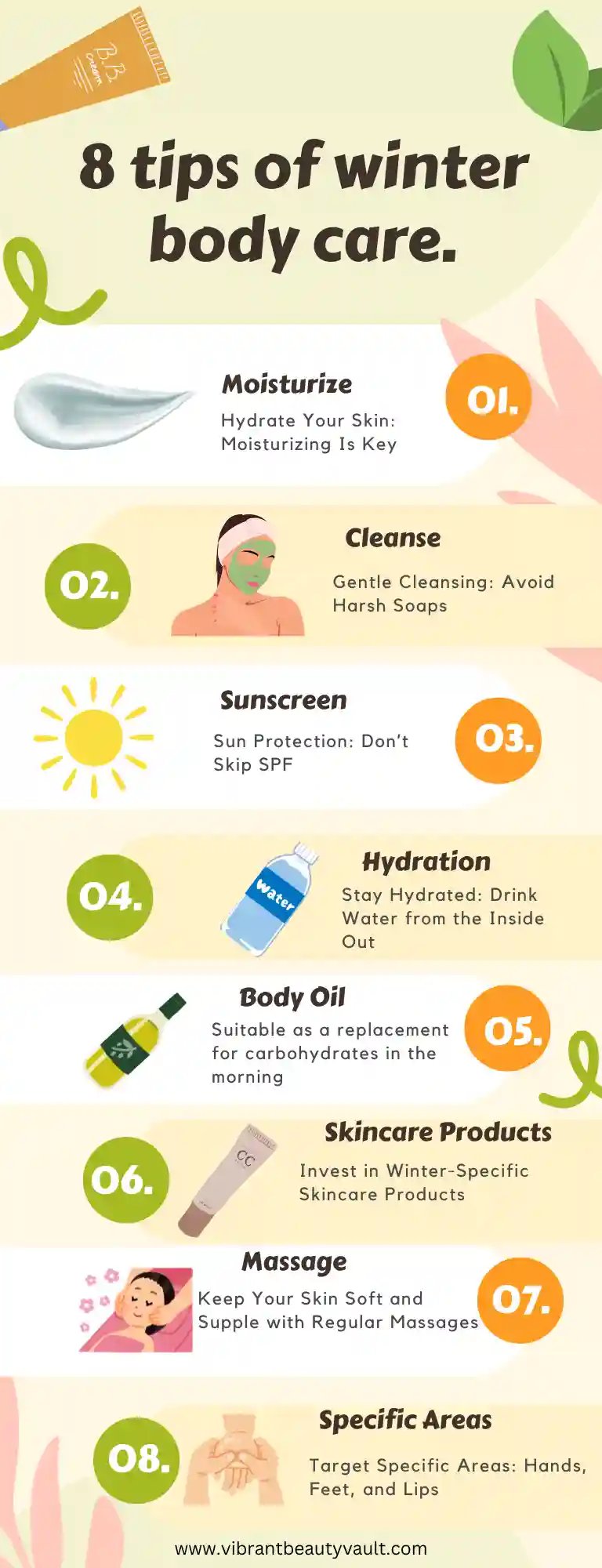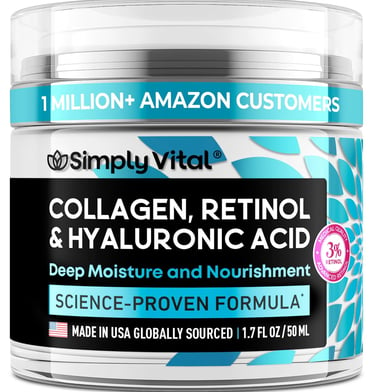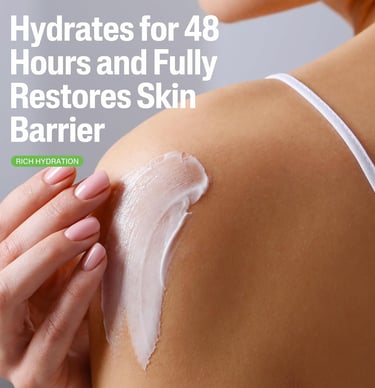Winter Body Care Routine Tips: How to Keep Your Skin Healthy and Hydrated During the Cold Months
As the temperature drops and winter sets in, our skin often experiences a variety of challenges. The cold air, low humidity, and harsh winds can lead to dry, flaky, and irritated skin. To combat these issues and maintain healthy, glowing skin throughout the colder months, it’s essential to adjust your body care routine. Here’s a detailed guide on how to protect and nourish your skin during winter.
1. Hydrate Your Skin: Moisturizing Is Key
Why It's Important: Winter air tends to strip your skin of its natural moisture, leaving it dry and dehydrated. Moisturizing helps replenish this lost hydration and creates a barrier that locks in moisture, preventing further dryness.
How to Do It:
Choose a Rich Moisturizer: Opt for thicker, more emollient creams or oils that provide long-lasting hydration. Look for ingredients like shea butter, ceramides, hyaluronic acid, and glycerin.
Moisturize Immediately After Showering: When your skin is still damp, apply your moisturizer. This helps to trap moisture into the skin, making it more effective.
Use a Humidifier: Dry indoor air can dehydrate your skin further. A humidifier can add moisture back into the air, keeping your skin from becoming too dry.
Apply More Frequently: In winter, you may need to apply moisturizer more often than usual, especially to areas that tend to get drier, like your elbows, knees, and hands.
2. Gentle Cleansing: Avoid Harsh Soaps
Why It's Important: While it's essential to cleanse your skin, harsh soaps can strip your skin of its natural oils, which are already compromised in winter.
How to Do It:
Use Mild, Hydrating Body Washes: Switch to a soap-free, hydrating body wash or cream cleanser that is gentle on the skin. Look for formulas that contain natural oils (like almond or coconut oil) or humectants (like glycerin) that draw moisture into the skin.
Limit Hot Showers: Although hot showers can be comforting in winter, they can also damage your skin by removing natural oils. Opt for lukewarm water instead and keep shower time to a minimum (10-15 minutes).
Exfoliate Gently: While exfoliating helps remove dead skin cells and improve skin texture, over-exfoliating can worsen dryness. Use a mild scrub or exfoliating glove once or twice a week, and be gentle to avoid irritation.
3. Target Specific Areas: Hands, Feet, and Lips
Why It's Important: Hands, feet, and lips are particularly prone to dryness and cracking during the winter months. These areas often need extra attention to stay soft and hydrated.
How to Do It:
Hands: Apply a rich hand cream multiple times a day, especially after washing your hands. Look for hand creams that contain nourishing ingredients like shea butter, aloe vera, or glycerin. Consider wearing cotton gloves overnight after applying hand cream for an intensive moisturizing treatment.
Feet: Dry, cracked heels are common in winter. Use a thick foot cream containing urea or lanolin to lock in moisture, and consider using a foot scrub to remove dead skin. Wearing socks after moisturizing can also help seal in hydration.
Lips: Cold air and wind can easily cause chapped lips. Keep a nourishing lip balm on hand, and look for one that contains beeswax, shea butter, or petroleum jelly. Avoid licking your lips, as this can further dry them out.


4. Sun Protection: Don’t Skip SPF
Why It's Important: Even though the sun’s rays might feel
weaker in winter, UV radiation can still cause damage to
your skin, especially when reflected off snow or ice. Sun protection
is just as important in winter as it is in summer.
How to Do It:
Use a Broad-Spectrum Sunscreen: Choose a sunscreen with SPF 30 or higher that protects against both UVA and UVB rays. Apply it to exposed areas like your face, neck, and hands, even on cloudy or overcast days.
Consider a Tinted Sunscreen: If you want added protection, a tinted sunscreen can provide both sunblock and an even skin tone, with the added benefit of protecting against visible light that can worsen pigmentation.
5. Stay Hydrated: Drink Water from the Inside Out
Why It's Important: Hydration starts from the inside, and drinking plenty of water is just as crucial for maintaining healthy skin in winter as it is in summer. The dry indoor air in winter can leave your skin looking dull and dry, but staying hydrated helps keep it plump and glowing.
How to Do It:
Drink More Water: Aim to drink at least 8 cups of water per day, and add herbal teas or water-rich foods like cucumbers and oranges to your diet.
Eat Omega-3 Rich Foods: Foods like fatty fish (salmon, mackerel), walnuts, and flaxseeds are great for keeping your skin healthy, as omega-3 fatty acids help strengthen the skin’s barrier and retain moisture.
6. Layer Up Your Skincare: Add Oils for Extra Moisture
Why It's Important: As temperatures drop, it can be beneficial to layer your skincare products to provide extra protection against the cold, harsh air.
How to Do It:
Add a Facial Oil: After moisturizing, apply a lightweight facial oil (like argan oil or jojoba oil) to lock in extra hydration. These oils also help to strengthen the skin’s natural moisture barrier.
Layer Your Body Creams: For extra dry areas, you can layer a thicker body butter or oil over your regular moisturizer.
7. Invest in Winter-Specific Skincare Products
Why It's Important: Winter calls for more specialized skincare. Some skincare products are designed specifically to tackle the challenges posed by the cold season, like extreme dryness, redness, or irritation.
How to Do It:
Look for Winter-Friendly Ingredients: Opt for products containing ceramides, hyaluronic acid, peptides, and fatty acids, which are excellent for strengthening the skin's barrier and preventing moisture loss.
Try Winter-Specific Serums: For the face, consider adding a hydrating serum to your routine, as they penetrate deeply and offer an extra layer of protection.
8. Keep Your Skin Soft and Supple with Regular Massages
Why It's Important: Massaging your skin is an excellent way to improve circulation, promote skin health, and prevent dryness. It also helps your body care products penetrate deeper into the skin, enhancing their effectiveness.
How to Do It:
Massage Your Body While Moisturizing: Take the time to gently massage your moisturizer or body oil into your skin. This not only helps the product absorb better but also increases blood flow, which can improve your skin’s appearance and texture.
Use a Dry Brush: A dry brush exfoliation before showering can help improve circulation, remove dead skin cells, and prevent the buildup of dry patches.
Final Thoughts: Embrace the Winter Season with Healthy Skin
Winter can be tough on your skin, but with a few simple adjustments to your body care routine, you can keep your skin nourished, hydrated, and glowing all season long. Moisturizing, gentle cleansing, using targeted treatments for your hands, feet, and lips, and protecting your skin from the sun are just a few ways to ensure your skin stays healthy throughout the colder months.
Remember, consistency is key. Stick to your winter skincare routine, and you'll be able to enjoy the winter season without worrying about dry, irritated skin.
















